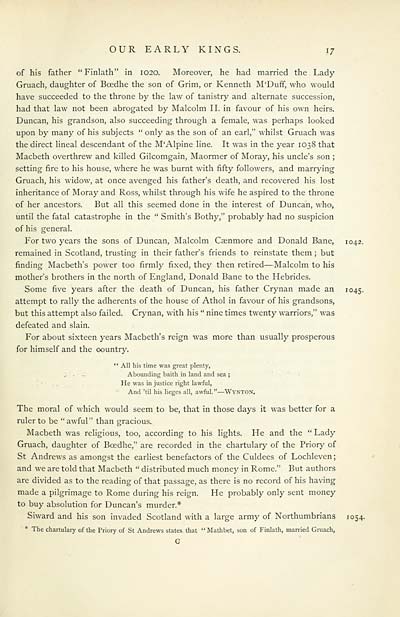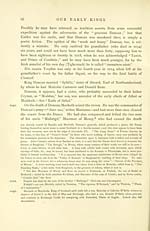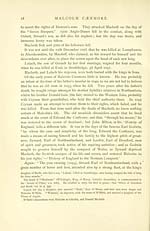Family records of the Bruces and the Cumyns
(29) Page 17
Download files
Complete book:
Individual page:
Thumbnail gallery: Grid view | List view

OUR EARLY KINGS. 17
of his father "Finlath" in 1020. Moreover, he had married the Lady
Gruach, daughter of Boedhe the son of Grim, or Kenneth M'Duff, who would
have succeeded to the throne by the law of tanistry and alternate succession,
had that law not been abrogated by Malcolm II. in favour of his own heirs.
Duncan, his grandson, also succeeding through a female, was perhaps looked
upon by many of his subjects " only as the son of an earl," whilst Gruach was
the direct lineal descendant of the M'Alpine line. It was in the year 1038 that
Macbeth overthrew and killed Gilcomgain, Maormer of Moray, his uncle's son ;
setting fire to his house, where he was burnt with fifty followers, and marrying
Gruach, his widow, at once avenged his father's death, and recovered his lost
inheritance of Moray and Ross, whilst through his wife he aspired to the throne
of her ancestors. But all this seemed done in the interest of Duncan, who,
until the fatal catastrophe in the " Smith's Bothy," probably had no suspicion
of his general.
For two years the sons of Duncan, Malcolm Caenmore and Donald Bane, 1042.
remained in Scotland, trusting in their father's friends to reinstate them ; but
finding Macbeth's power too firmly fixed, they then retired — Malcolm to his
mother's brothers in the north of England, Donald Bane to the Hebrides.
Some five years after the death of Duncan, his father Crynan made an 1045.
attempt to rally the adherents of the house of Athol in favour of his grandsons,
but this attempt also failed. Crynan, with his " nine times twenty warriors," was
defeated and slain.
For about sixteen years Macbeth's reign was more than usually prosperous
for himself and the country.
" All his time was great plenty,
.- . .. Abounding baith in land and sea ;
He was in justice right lawful,
And 'til his lieges all, awful. " — Wynton.
The moral of which would seem to be, that in those days it was better for a
ruler to be "awful" than gracious.
Macbeth was religious, too, according to his lights. He and the "Lady
Gruach, daughter of Bcedhe," are recorded in the chartulary of the Priory of
St Andrews as amongst the earliest benefactors of the Culdees of Lochleven;
and we are told that Macbeth " distributed much money in Rome." But authors
are divided as to the reading of that passage, as there is no record of his having
made a pilgrimage to Rome during his reign. He probably only sent money
to buy absolution for Duncan's murder.*
Siward and his son invaded Scotland with a large army of Northumbrians 1054.
* The chartulary of the Priory of St Andrews states that " Mathbet, son of Finlath, married Gruach,
G
of his father "Finlath" in 1020. Moreover, he had married the Lady
Gruach, daughter of Boedhe the son of Grim, or Kenneth M'Duff, who would
have succeeded to the throne by the law of tanistry and alternate succession,
had that law not been abrogated by Malcolm II. in favour of his own heirs.
Duncan, his grandson, also succeeding through a female, was perhaps looked
upon by many of his subjects " only as the son of an earl," whilst Gruach was
the direct lineal descendant of the M'Alpine line. It was in the year 1038 that
Macbeth overthrew and killed Gilcomgain, Maormer of Moray, his uncle's son ;
setting fire to his house, where he was burnt with fifty followers, and marrying
Gruach, his widow, at once avenged his father's death, and recovered his lost
inheritance of Moray and Ross, whilst through his wife he aspired to the throne
of her ancestors. But all this seemed done in the interest of Duncan, who,
until the fatal catastrophe in the " Smith's Bothy," probably had no suspicion
of his general.
For two years the sons of Duncan, Malcolm Caenmore and Donald Bane, 1042.
remained in Scotland, trusting in their father's friends to reinstate them ; but
finding Macbeth's power too firmly fixed, they then retired — Malcolm to his
mother's brothers in the north of England, Donald Bane to the Hebrides.
Some five years after the death of Duncan, his father Crynan made an 1045.
attempt to rally the adherents of the house of Athol in favour of his grandsons,
but this attempt also failed. Crynan, with his " nine times twenty warriors," was
defeated and slain.
For about sixteen years Macbeth's reign was more than usually prosperous
for himself and the country.
" All his time was great plenty,
.- . .. Abounding baith in land and sea ;
He was in justice right lawful,
And 'til his lieges all, awful. " — Wynton.
The moral of which would seem to be, that in those days it was better for a
ruler to be "awful" than gracious.
Macbeth was religious, too, according to his lights. He and the "Lady
Gruach, daughter of Bcedhe," are recorded in the chartulary of the Priory of
St Andrews as amongst the earliest benefactors of the Culdees of Lochleven;
and we are told that Macbeth " distributed much money in Rome." But authors
are divided as to the reading of that passage, as there is no record of his having
made a pilgrimage to Rome during his reign. He probably only sent money
to buy absolution for Duncan's murder.*
Siward and his son invaded Scotland with a large army of Northumbrians 1054.
* The chartulary of the Priory of St Andrews states that " Mathbet, son of Finlath, married Gruach,
G
Set display mode to:
![]() Universal Viewer |
Universal Viewer | ![]() Mirador |
Large image | Transcription
Mirador |
Large image | Transcription
Images and transcriptions on this page, including medium image downloads, may be used under the Creative Commons Attribution 4.0 International Licence unless otherwise stated. ![]()
| Histories of Scottish families > Family records of the Bruces and the Cumyns > (29) Page 17 |
|---|
| Permanent URL | https://digital.nls.uk/95071334 |
|---|
| Description | A selection of almost 400 printed items relating to the history of Scottish families, mostly dating from the 19th and early 20th centuries. Includes memoirs, genealogies and clan histories, with a few produced by emigrant families. The earliest family history goes back to AD 916. |
|---|

